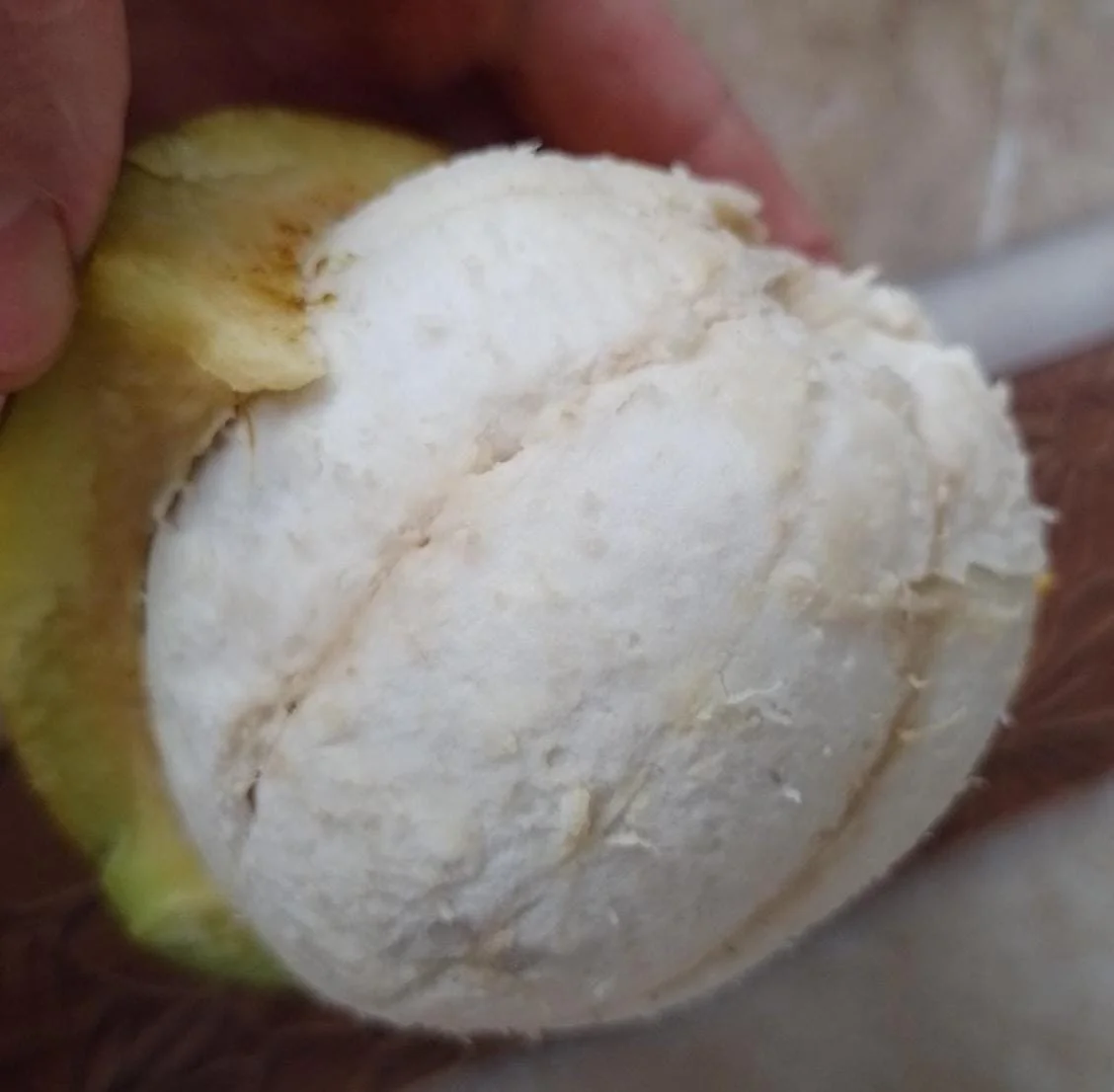Platonia Insignis - Bacuri - Gigante? - Read before purchasing
Seeds were imported from Brazil. Platonia insignis is a dry-season deciduous tree, reaching 25–40 m high. It has a pyramidal crown and copious yellow latex in the bark. The leaves are opposite, simple oblong to elliptic, 8–15 cm long, and glossy dark green, with wavy margins and a leathery texture. The flowers are 5–7 cm long and pink in color, with five petals and numerous stamens. The fruit is round to oval, with a thick, yellow skin. It resembles a papaya. The rind exudes a yellow latex when pressed. The sticky white pulp is fragrant, with a taste that is both sweet and sour. There are 3 to 5 seeds. The Bacuri is grown for its fruit, which is made into various condiments and beverages. It contains high levels of phosphorus, iron, and vitamin C. The oily brown seeds are used as a home remedy to treat skin conditions. Its yellowish wood is frequently used as timber. Many of the Brazilians I have spoken with have talked very highly about this fruit. Some have claimed it is their favorite fruit they have ever eaten. The seller of these seeds in Brazil, CLAIMS this tree regularly produces larger fruits, with more pulp than normal. Growing this from seed, does not gaurentee your tree will also produce larger fruits like the mother. We are listing these as the same price as the regular Platonia Insignis we has listed earlier in the year, just in case. These seeds were freshly harvested, and you can see the quality of them in the photos. The fruit photo is from the same fruit these seeds were collected from.
Seeds were imported from Brazil. Platonia insignis is a dry-season deciduous tree, reaching 25–40 m high. It has a pyramidal crown and copious yellow latex in the bark. The leaves are opposite, simple oblong to elliptic, 8–15 cm long, and glossy dark green, with wavy margins and a leathery texture. The flowers are 5–7 cm long and pink in color, with five petals and numerous stamens. The fruit is round to oval, with a thick, yellow skin. It resembles a papaya. The rind exudes a yellow latex when pressed. The sticky white pulp is fragrant, with a taste that is both sweet and sour. There are 3 to 5 seeds. The Bacuri is grown for its fruit, which is made into various condiments and beverages. It contains high levels of phosphorus, iron, and vitamin C. The oily brown seeds are used as a home remedy to treat skin conditions. Its yellowish wood is frequently used as timber. Many of the Brazilians I have spoken with have talked very highly about this fruit. Some have claimed it is their favorite fruit they have ever eaten. The seller of these seeds in Brazil, CLAIMS this tree regularly produces larger fruits, with more pulp than normal. Growing this from seed, does not gaurentee your tree will also produce larger fruits like the mother. We are listing these as the same price as the regular Platonia Insignis we has listed earlier in the year, just in case. These seeds were freshly harvested, and you can see the quality of them in the photos. The fruit photo is from the same fruit these seeds were collected from.
Seeds were imported from Brazil. Platonia insignis is a dry-season deciduous tree, reaching 25–40 m high. It has a pyramidal crown and copious yellow latex in the bark. The leaves are opposite, simple oblong to elliptic, 8–15 cm long, and glossy dark green, with wavy margins and a leathery texture. The flowers are 5–7 cm long and pink in color, with five petals and numerous stamens. The fruit is round to oval, with a thick, yellow skin. It resembles a papaya. The rind exudes a yellow latex when pressed. The sticky white pulp is fragrant, with a taste that is both sweet and sour. There are 3 to 5 seeds. The Bacuri is grown for its fruit, which is made into various condiments and beverages. It contains high levels of phosphorus, iron, and vitamin C. The oily brown seeds are used as a home remedy to treat skin conditions. Its yellowish wood is frequently used as timber. Many of the Brazilians I have spoken with have talked very highly about this fruit. Some have claimed it is their favorite fruit they have ever eaten. The seller of these seeds in Brazil, CLAIMS this tree regularly produces larger fruits, with more pulp than normal. Growing this from seed, does not gaurentee your tree will also produce larger fruits like the mother. We are listing these as the same price as the regular Platonia Insignis we has listed earlier in the year, just in case. These seeds were freshly harvested, and you can see the quality of them in the photos. The fruit photo is from the same fruit these seeds were collected from.




